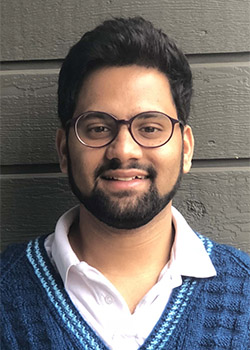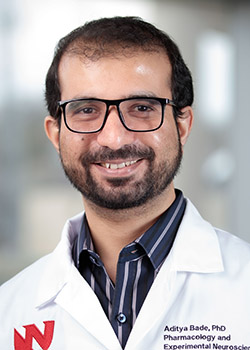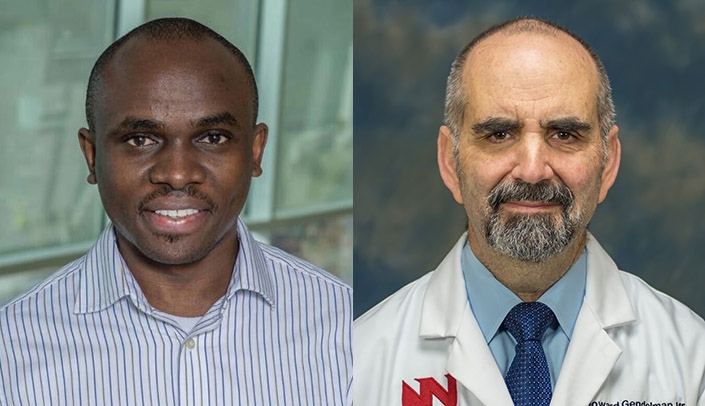A novel means to prevent HIV infection was developed at UNMC that could allow people with or at risk of acquiring the virus to take medicines once a year. The advance has the potential to eliminate complications that arise from missing doses of life-saving medicines, according to the study published Monday in “Nature Materials,” a leading peer-reviewed biomedical research journal.
The research team led by Benson Edagwa, Ph.D., assistant professor, UNMC Department of Pharmacology and Experimental Neuroscience, and Howard Gendelman, M.D., chairman and professor of the department, developed the world’s first potential yearlong antiretroviral (ARV) for prevention of HIV infection by converting a month-long ARV drug into a once-per-year therapeutic.
“This pharmaceutical development has the potential to not only treat but also prevent viral transmission,” said Dr. Gendelman, who designed the pharmacological testing. “This may certainly be a therapeutic milestone.”
The study describes what could function as a vaccine mimetic to protect the body against HIV infection for an extended time period.
“While viral vaccines and long-acting modified ARVs have very different modes of action, they can both function to protect against infection,” Dr. Gendelman said.
Currently, individuals with HIV must take their medicine daily to control the disease. If proven safe and effective in clinical studies, the UNMC treatment would allow people with HIV to receive an injectable medicine once yearly.
The innovations now in development could prevent HIV transmission in individuals vulnerable to infection. Although existing ARV regimens allow individuals with HIV to live with minimal health complications and prevent HIV transmission to sexual partners, the risk of missing daily treatment is a major health care concern. Missing daily doses of ART can cause the virus to rebound and cause associated comorbidities.
 |  |
Tanmay Kulkarni | Aditya Bade, Ph.D. |
Drs. Edagwa and Gendelman credited a large team of scientists within the department for work on the project, including instructor Aditya Bade, Ph.D., and graduate student Tanmay Kulkarni.
The scientists created a year-long-acting medicine from the parent drug cabotegravir (CAB). CAB is a potent HIV-1 drug that blocks the virus from inserting its genetic material into human cells. By chemically converting CAB into a nanocrystal and allowing the body’s own enzymes to slowly convert the modified drug into an active form, the drug can be slowly released from tissue stores.
“This occurs for extended time periods, and in laboratory and animal testing, up to a year,” said Dr. Edagwa, who designed and produced the required modifications of the new prodrug. A prodrug is a classification of pharmaceutical products where an inert compound is converted into an active form by the body.
The UNMC team developed its ARV treatment by modifying the molecular structure of prodrugs produced and engineered in laboratories on the UNMC campus and tested in mice and non-human primates. Human testing has not yet begun, but the development necessary to achieve this goal is ongoing with the assistance of scientists from the Clinton Health Access Initiative (CHAI). Paul L. Domanico, Tai-Yuen Yue and Gary Moore of CHAI are co-authors on the “Nature Materials” paper and are actively engaged with UNMC scientists to facilitate transitioning from animal to human testing.
Current active research in drug properties, administration and potential toxicities are now underway and required before the vaccine mimetic could obtain U.S. Food and Drug Administration approval to eventually enter the market. To date, no adverse side effects have been demonstrated in any of the animal testing models.
CAB was originally developed by ViiV Healthcare, a pharmaceutical subsidiary of GlaxoSmithKline that specializes in the development of therapies for HIV infection. The prodrug nanocrystal approach invented by Drs. Edagwa and Gendelman enhanced the prior version of the medicine.
“Partnerships and collaborations will take what we did in the Nebraska Nanomedicine Production Plant (NNPP) and develop the drug for potential use by HIV patients and those vulnerable to infection,” said Dr. Gendelman, who also serves as interim director of the NNPP, a resource that provides support for product research, development and manufacturing of nanoformulated drugs.
The drug reformulation is an important avenue for advancing the science-based treatment of maladies that range from HIV to other viral outbreaks, potentially including COVID-19, Dr. Gendelman said.
Other UNMC contributors to the “Nature Materials” report include: Brady Sillman Ph.D, Bhagya Laxmi Dyavar Shetty, Melinda S. Wojtkiewicz, Nagsen Gautam Ph.D., James R. Hilaire, Ph.D., Sruthi Sravanam, Adam Szlachetka, Benjamin G. Lamberty Brenda M. Morsey, Howard S. Fox, M.D., Ph.D., Yazen Alnouti, Ph.D., JoEllyn M. McMillan, Ph.D., R. Lee Mosley, Ph.D., and Jane Meza, Ph.D.

Wow – another big breakthrough! Super congrats to Team Gendelman/Edagwa!
Exciting new methods. Keep up the wonderful work Dr. Edagwa and Dr. Gendelman. You make a great team.
This is awesome,looking forward for this to get into market….
Dr.Gendelman and Dr.Edagwa,millions of hiv positive looking at you with bigggg hopes!!!Good luck and GODLESS YOU both.
This is an excallent development, but how can one access the drug and how much does it cost for a full dose.
Thanks,
Opio Ogenyi
Plz do human trial and circulate the medicine as soon as possible. Coz lot of people r waiting for this vaccine.
Congratulations, so proud of all of you.
Jeanne Lynch